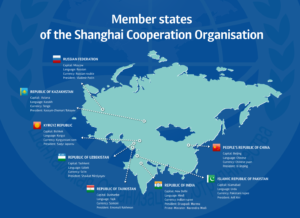This article explores India’s diplomatic skills through PM Modi’s diplomatic engagements, highlighting the importance of striking a careful balance in a rapidly changing global landscape.(Source: The Hindu , 19th May,2023)
What is the context?
Prime Minister Narendra Modi‘s journey to Japan, Papua New Guinea, and Australia is starting from May 19. It holds significant discussions on global issues. India’s position in the multilateral sphere became crucial as it navigates a polarized world,. It is with bilateral matters assuming a secondary role. It is marked by the aftermath of the Russian war in Ukraine and the geopolitical challenges posed by China.
Engagement with the Quad:
- The Quad Summit in Sydney, involving Australia, India, Japan, and the U.S., has been canceled due to domestic troubles faced by U.S. President Joe Biden.
- However, the four Quad leaders will still meet on the sidelines of the G-7.
- PM Modi’s subsequent visit to Washington in June as a state guest aims to strengthen India-U.S. ties strategically.
Hosting the SCO Summit:
- Shortly after, PM Modi will host the Shanghai Cooperation Organisation (SCO) Summit on July 3-4.
- Notable attendees include China’s President Xi Jinping, Russia’s President Vladimir Putin, Pakistan’s Prime Minister Shehbaz Sharif, leaders of Central Asian states, potential new SCO members, and other guests.
Significance of the SCO:

- The SCO is often perceived as an anti-Western alliance, with many of its members subject to Western sanctions.
- India finds comfort in the SCO’s common stance against unilateral sanctions, such as those imposed on Russia.
- The recent Shanghai Cooperation Organisation Council for Foreign Ministers (SCO-CFM) meeting in Goa highlighted the need for greater focus on multilateral outcomes and less emphasis on bilateral issues, which has caused annoyance among Central Asian countries.
- The Shanghai Cooperation Organisation (SCO) is a comprehensive regional organization encompassing political, economic, international security, and defense aspects.
- The member states of the Shanghai Cooperation Organisation (SCO) include:
- China
- Russia
- Kazakhstan
- Kyrgyzstan
- Tajikistan
- Uzbekistan
- India (as a full member since 2017)
- Pakistan (as a full member since 2017)
- It holds the distinction of being the largest regional organization worldwide, both in terms of geographic coverage, spanning approximately 60% of Eurasia’s area, and population, representing around 40% of the global population. Additionally, the SCO member states collectively contribute to roughly 20% of the global GDP.
European Union Engagement:
- Following the SCO summit, PM Modi will pivot towards the European Union. Here he will be the chief guest at France’s national “Bastille Day” parade.
- France celebrates the national day on 14 July each year, commonly referred to as Bastille Day in English-speaking countries.
- PM Modi’s team expects him to make additional visits to other European capitals.
BRICS Summit in South Africa:
- In August, PM Modi will participate in the BRICS summit in South Africa. The summit engages with leaders from Russia, China, Brazil, and South Africa.
- The summit will explore alternative BRICS payment mechanisms, seeking to build a counter-narrative to the U.S.-European Union dominance in the international system.
- BRICS is a term coined by Jim O’Neill, a Goldman Sachs economist, in 2001. It was to represent the initial grouping of Brazil, Russia, India, and China. It was expected that these four fast-growing economies would collectively dominate the global economy by 2050. South Africa joined the group in 2010, expanding it to BRICS, representing five regional economies.
G-20 Summit in Delhi:
- In September, PM Modi will host the G-20 summit in Delhi, a rare occasion where leaders of all permanent members of the UN Security Council will visit Delhi in the same year.
- This summit will put India’s diplomatic skills to the test, as it aims to forge a consensus among diverse nations.
Striking a Balance:
- PM Modi’s engagements are not a result of traditional non-alignment but rather his own version of “multi-directional engagements.”
- India’s diplomatic skills are evident in its ability to maintain a delicate balance between conflicting interests. Countries across the global divide actively court India due to its diplomatic acumen.
- Autonomy and multi-alignment have proven successful for India, as evident from the trends observed among countries in South East Asia and the Global South.
Potential Challenges and Scenarios:
- Certain events, such as Ukraine’s spring offensive, Chinese aggression across the Line of Actual Control, or Russia’s belligerence over payment issues, could compel India to reassess its policies.
- Decisions by the U.S. and Europe to impose unilateral sanctions on India could also disrupt the balance.
- Nevertheless, if these unlikely scenarios do not occur, India is likely to continue pursuing its interests on both sides of the geopolitical fence.
India’s Role at G-20:
- Failure to ensure a consensus on a joint communique at the SCO and BRICS summits could present challenges for India at the G-20 summit.
- While the G-7 seems willing to ignore or exclude India and China, India’s role as a consensus builder becomes vital.
- The next 100 days will determine India’s ability to maintain a fair balance and be a gracious host at the G-20 summit.
Conclusion:
Prime Minister Modi’s upcoming global engagements hold immense significance for India’s position in the multilateral sphere. In striking a delicate balance between conflicting interests, PM Modi’s diplomatic skills will face a test as he navigates a polarized world. India’s ability to maintain its reputation as a fair and gracious host while forging consensus among diverse nations will shape its role in the evolving global landscape.
Possible UPSC CSE Mains questions
- Discuss the importance of ensuring a consensus at the SCO and BRICS summits for India’s role at the G-20 summit. Analyze the role of India as a consensus builder, considering the exclusion of India and China by the G-7.
For more understanding and analysis of current affairs, please visit
